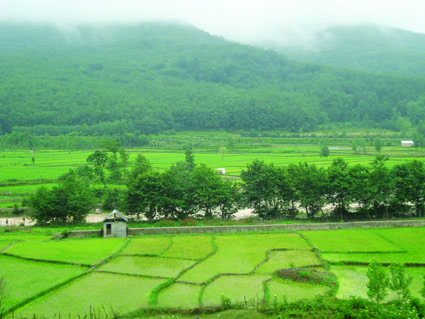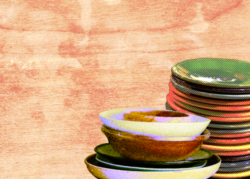Editor’s note: The following account was written by an Iranian-American Georgetown student who was in Iran during the presidential election and its heated aftermath. The Voice has granted the author anonymity because the Iranian government has begun to interrogate and revoke exit visas to individuals who publicly discuss these events, and the author regularly visits his family there. All photos were taken by the author.
Voices boomed from the rooftop on the drive to the Tehran airport. “Allah Akbar (God is great)! Death to the dictator! Death to this government that misleads people!” As we drove farther into southern Tehran the voices continued. My grandmother whispered to me, “This was how it was like at night in the months leading up to the Revolution.”
Only a couple of weeks earlier, Iran had been feverish with excitement over the coming presidential election. Mir Hossein Mousavi, who was the Prime Minister of Iran during the Iran-Iraq War of the 1980s, was challenging the incumbent President Mahmoud Ahmedenijad, an agent provocateur. The campaign made many Iranians hopeful that his election would take the country in a new direction, away from Ahmedinejad’s aggravations of Israel and America. In Tehran, where I was spending the summer with my grandparents, exhilarated drivers honked their horns until the early hours of the morning. The color green, which Mousavi chose to represent his campaign and identify with core Islamic values, decorated shop windows and cars all over the city. Returning from a party late one night, I came upon a car with a blinding green strobe light in its rear window. Once during the campaign, I was even caught in a traffic jam caused by Mousavi’s supporters, who were dancing in the street outside of his election headquarters.

I, however, was not caught up in the excitement. I was in Iran, my second home, to visit my extended family and to help my elderly grandparents, same as I had done almost every summer since high school. (It is almost impossible for my relatives to obtain U.S. visas, due to restrictions placed by both countries. I have dual citizenship, so the process is easier for me.) In spite of its repressive government, Iran’s culture is not stagnant. I have played paintball in Iran and seen paintings by Picasso in Tehran’s Museum of Contemporary Art, which, although it compiled one of the world’s greatest art collections during the 1970 oil boom, has let most of its art languish in its basement since the 1979 Revolution. I have taken yoga classes and gone to gay parties and dance contests, which take place in secret.
This past summer, I had planned to learn more about Iran’s huge, underground gay community for my thesis and help my friends gather signatures for a feminist movement that would challenge Iran’s patriarchal laws. I had never intended to get involved in the election.
In fact, when I arrived in May, I had already decided against voting in the election. On a previous visit, I had watched as a government employee reduced my grandmother to tears as he screamed at her in Tehran’s airport for not wearing socks, which violates Iran’s patriarchal laws.The same government had my great uncle killed in the early days of the Revolution because he was gay. The Iranian government always claims high election turnout as evidence that citizens support it, so in protest, I deliberately left the documents I would need to vote back at home in the U.S.

For the first few weeks of my stay, I was disgusted at the sight of the green armbands worn by Mousavi’s hopeful supporters. When a friend called to invite me to one of his Tehran rallies, I hung up on him. I couldn’t understand why people would place their hopes for change in Mousavi when he, like all the candidates in Iran’s election, had been vetted and approved by its government. He wasn’t even the reform candidate—he was a moderate conservative politician with extensive ties to the Iranian political establishment.
That changed, however, when I took a weeklong trip with my grandparents to Babolsar, a town on Iran’s lush Caspian coast, in late May. One morning, while my grandparents were shopping at the local bazaar, I wandered on my own toward the main road. I saw two girls standing outside a storefront, wearing green armbands in support of Mousavi and handing out flyers and sweets. My first instinct was to turn away, but I was struck by the huge banner above the store’s entrance, which read: “We had a revolution in order to attain freedom!” The words, I learned, were Mousavi’s. Surprised that an establishment candidate would dare to cast doubt on the success of the Revolution, I walked into the store. At that moment a TV on the wall was blasting Mousavi’s commercial, which used two anthems popular before the 1979 Revolution that the government frowns upon. I read a flyer that one of the girls had given me, which enumerated Mousavi’s campaign promises, including allowing more freedom to intellectuals, curtailing the regime’s moral police, and improving Iran’s global image.
I reacted the same way many Iranians had: with amazement that a candidate approved by the current government was pressing for such deep systematic reforms—reforms I felt Iran desperately needed. I became part of the grassroots movement that supported Mousavi’s campaign, mobilizing others since I couldn’t vote myself. I sent text messages to friends and relatives reminding them to watch the debates Mousavi would appear in and prodded my grandparents to watch his commercials on TV.

At the same time, the movement grew around me. Almost daily, my phone buzzed with alerts about political rallies and text messages ridiculing Ahmadinejad. I began to see pictures of Mir Hossein Mousavi popping up in many of the local stores. I asked a butcher who hung one such sign in his store whether or not he was afraid of losing business over his political views.
“No, in this environment, I doubt anyone would stop shopping here because they were offended that I did not want to vote for our horrible president,” he told me.
On June 12, I accompanied my grandparents to the local polling station where they voted. The line stretched around the block. In western Tehran, my grandmother’s best friend waited over an hour to vote. By the end of the day, most people I spoke to were predicting that Mousavi would be declared the winner, since high turnout rarely benefits hardliners in Iranian elections.
That evening I surfed foreign TV channels on my grandparents’ illegal satellite dish for early election results. At midnight, I learned through Al-Jazeera’s English network that Mousavi had claimed victory in the election based on turnout figures. Ecstatic, I ran into my grandparents’ bedroom to wake them up. Within a few minutes, however, Al-Jazeera also reported that Ahmadinejad, according to official state media, had won with a huge mandate, based on the five million votes that the government had already counted. Elections within Iran are conducted without computerization; a citizen’s vote must be both handwritten and hand-counted, making it close to impossible that the government had actually counted five million votes by that time.

The next morning, most of my neighborhood seemed to be in shock. My barber broke down in tears while he was cutting my hair; the local fruit shop owner wore black; a small appliance store owner yelled, “They won’t get away with this!”
Later in the day, while I was playing soccer with some of my friends, a man ran into our apartment complex with blood pouring down the side of his face. A small protest had formed outside the Interior Ministry in Fatemieh Square, and government agents were beating many of the people gathered there.
Things escalated quickly from then on. The next day, I could see smoke rising from many Tehran neighborhoods. Some of the fires, I learned, were from buses that protesters had set on fire to stymie attacks by police. That night I could barely sleep. Distant explosions—firecrackers set off by protesters and shots police fired to disperse them—and the smell of smoke woke me throughout the night.
Two days after the election, I joined the protesters. With some of my friends, I went to Vali-ye-Asr Street, where sporadic protests erupted while Ahmadinejad held his victory rally down the street. Protesters had set small plastic trash cans on fire all along the road, and they now gave off a terrible stench. Larger dumpsters were tipped over in the street, their contents engulfed by flames. Over the noise of hundreds of protesters I heard the revving of engines, and then a small blast. The Basij, the paramilitary wing of Iran’s Revolutionary Guard, had launched tear gas at the protesters up the road to disperse them. I decided to go home, but friends convinced me to run into the nearby Dey Hospital until the waves of Basij heading from the victory rally had passed. Inside I met a sobbing nurse who told me that the Basij had shot tear gas into the hospital’s foyer to disperse protesters, hitting post-operation patients, who were now in agony. After the wave of Basij passed, I ran out of the hospital and did not stop until I reached home.
The next day, Mousavi told supporters to gather at Vali-ye-Asr Square, where Ahmadinejad had held his victory rally, to demonstrate their numbers. However, by noon the government was issuing ominous calls on all TV and radio stations for “the supporters of Islam and the government to manifest themselves.” On his website, Mousavi retracted his calls for a protest. Nonetheless, my aunt and her family called and said that they were going to walk toward Vali-ye-Asr Street to see what was happening. I eagerly agreed to join them. We went without signs and took care not to wear green. We joined the growing ranks of protesters who were on their way to Vanak Square, where thousands of Mousavi supporters had gathered and prevented the Basij from heading north from a pro-government rally.
But before we reached the square, a swarm of Basij on motorcycles approached from the south end of the street. My uncle, who realized that they were beating people as they sped through the crowd, yelled at us to run into an alley. We were halfway down the alley when we heard the roar of motorcycle engines behind us. I ducked behind a car and saw the wheels of the approaching motorcycles from underneath. Farther up the alley, an officer struck a teenage boy, who screamed in pain. Another officer waved his baton in my face.
“Move now or I will hit you so hard I’ll move you that way!” he screamed.
“I … I’m here … to … go to the pharmacy with my aunt,” I said.
There really was a pharmacy at the end of the street, but the Basij officer did not care. He hit me on my back as I bolted toward the pharmacy. Once inside, I found the bathroom and locked myself inside.
My aunt, meanwhile, had not run. The Basij threatened to beat her for defiance.
“If you hit a mother standing here with her little girl, you will never be able to stand before God with a clear mind!” she cried.
“If you were a man, you would have been on the floor writhing in pain by now!” the officer yelled, just before racing away.
I eventually came out of the pharmacy bathroom and met up with my family. On the way back to the car, my family and I decided to go back to the protests the next day.
“Those idiots can’t scare me,” my aunt said. “I used to distribute socialist fliers during the ’79 revolution.”
So on June 17, we went to the massive protest that took place in Tir Square. Foreign media outlets struggled to measure the size of that day’s protest, with estimates ranging from 70,000 to 500,000. People in every direction were joined in complete silence. The eeriness of the protest proceeded unbroken by singing or chanting, only low conversations amongst the crowd, like the elderly women of the generation that had lost rights when the current regime put repressive laws in place. These women demonstrated in the hope of recovering those long-lost rights.
“I marched during the Revolution to obtain freedom and I want to eventually see it before my life is over,” one woman told me.
On June 18, I went to the Toopkhooneh Square rally in southern Tehran, where the silent protesters numbered in the hundreds of thousands. Some marched dressed entirely in black, holding burning candles to memorialize those who had been killed. We marched through parts of Tehran that the foreign media had previously labeled “pro-Ahmadinejad areas”, and we were thrilled to be greeted by people flashing V signs for victory and stringing green banners from their balconies. By this time, neighborhoods had erected small shrines on the roadside with burning black candles and pictures of those who had died in the protests. At the Azadi Square protest, days earlier, the Basij had attacked and shot protesters after dark.
“Leave before it gets dark, you never know what those animals might do,” people began to say to one another.
But once in their cars, people grew defiant again, and choruses of honking horns filled Tehran’s streets.
The next day, Ayatollah Ali Khameini gave a speech that intended to end the protests and put Iran on lockdown. The Supreme Leader declared the election to be a “divine mandate,” and the matter was settled. On Saturday, my uncle tried to go to Haft-e-Tir Square to see what was happening, yet all of the streets leading to the square were blocked. Riot police were standing at almost all the main street corners, wielding batons. The entire day, my grandparents and I listened to gunshots go off. The government announced that ten people had died that day. I knew even before foreign reports challenged this number, however, that the government’s figures were propaganda. My grandfather had returned from work at the hospital crying. At least ten people had been severely injured that day—two boys had been beaten so severly around the face that one of my grandfather’s colleagues had to amputate their eyes. Members of the Basij later went to the hospital to retrieve the names of the injured.
During the final two weeks of my stay, the international telephone network had become increasingly unreliable, as government censors disconnected phone calls made to my parents whenever I spoke certain words, like “protest,” or received any calls made from the United States to my phone.
Only weeks earlier, I had been marching in the streets of Tehran, elated, clutching a picture of Mir Hossein Mousavi, hopeful that Iran’s democratic transition of power would occur without violence. Now I sat in the car on the way to the airport, listening to shouts of “Death to the dictator!” echo from rooftops. The knowledge that so many Iranians had died—and many more were being imprisoned and likely tortured—weighed on me heavily. On my flight home to the U.S., I broke down and cried.





Anonymous source? Come one Voice, where’s the credibility?
*on
When you are dealing with a government that systematically targets all “enemies” of the regime, it is very difficult to get people to come forward to describe their experiences in that country while attaching their name to that experience.
The Iranian Interests Section is located only blocks away on Wisconsin Avenue.
The Voice of America, which is obsessed with credibility, interviewed this same individual and agreed to allow them to be interviewed anonymously and with voice alteration after viewing their Iranian passport (with its stamps marking when they came and left).
Its better for the Georgetown community to find out what is going on in Iran from a credible anonymous source than remain in the dark of the important events that are taking place there.